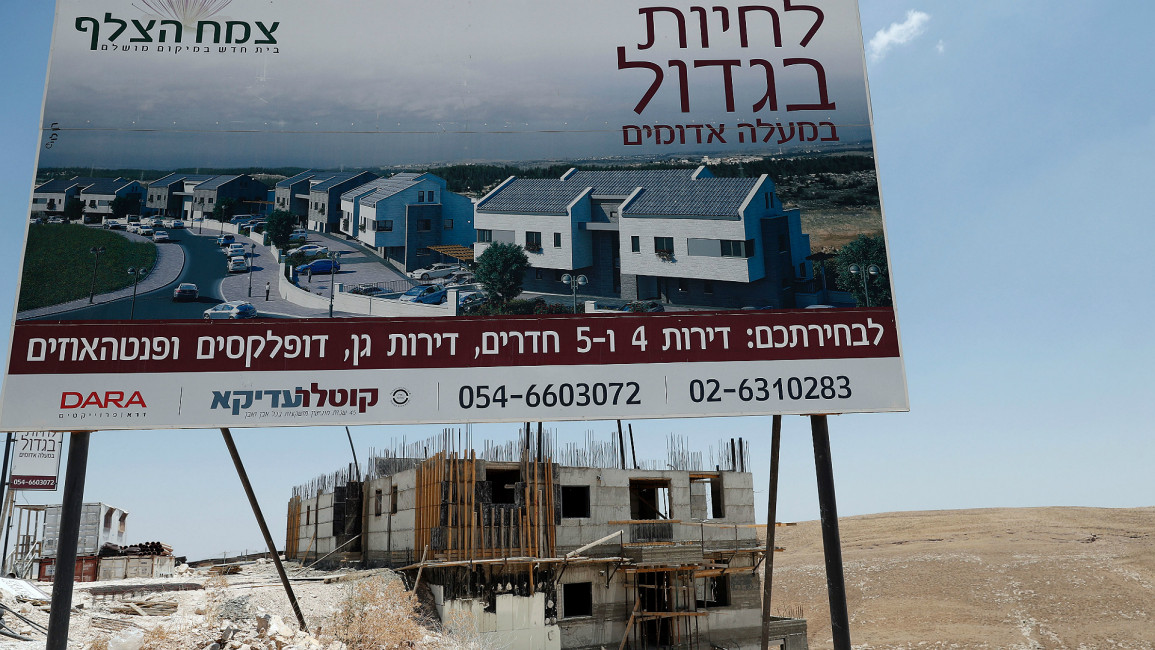Israel approves hundreds of new settler homes after attacks
Israel has approved hundreds of new settler homes in the occupied West Bank in a move likely to further raise tensions following a rising wave of violence.
The approval comes days after a key international report warned that Israel's settlement expansion and land confiscation were eroding the possibility of a two-state solution to the conflict.
The report from the diplomatic Quartet – the United States, European Union, United Nations and Russia – also called on Palestinians to halt alleged attacks and "incitement to violence".
Under the new approval granted by Israeli Prime Minister Binyamin Netanyahu and Defence Minister Avigdor Lieberman, planning for 560 new homes in the large Maale Adumim settlement east of Jerusalem will be allowed to move forward.
The Maale Adumim mayor was informed of the decision on Sunday night, a spokesman for him told AFP. The settlement established in 1975 already includes a population of more than 37,000.
Netanyahu also gave approval for the planning of 240 new homes in East Jerusalem settlement neighbourhoods, as well as for 600 units for Palestinians in the city's Beit Safafa district, media reported.
The decision follows calls among Israelis for a harsh response to a wave of violence that has killed 214 Palestinians and 34 Israelis since October.
 |
Under the new approval granted by Israeli Prime Minister Binyamin Netanyahu and Defence Minister Avigdor Lieberman, planning for 560 new homes in the large Maale Adumim settlement east of Jerusalem will be allowed to move forward |  |
Most of the Palestinians were allegedly carrying out knife, gun or car-ramming attacks, according to Israeli authorities.
Others were killed in clashes with security forces or by Israeli airstrikes on the Gaza Strip, with Israeli forces being accused of using excessive force in some cases.
Palestinians say the rise in knife attacks on Israeli soldiers is rooted in frustration stemming from nearly five decades of Israeli military occupation.
Demolishing Palestinian homes
On Monday, four Palestinian youths were wounded in clashes with Israeli forces who were demolishing the West Bank homes of two assailants' families, a Palestinian health official said.
One of the four was seriously wounded, according to Ramallah hospital director Ahmad Bitawi.
The Israeli military said troops were in the Qalandiya refugee camp demolishing the homes of the families of two Palestinians who stabbed and killed an Israeli near Jerusalem's Old City in December, during which the assailants were shot dead by Israeli guards, and a second Israeli died after apparently being shot mistakenly by police in the confusion.
During Monday's demolitions, riots erupted and Palestinian demonstrators opened fire on soldiers, the army said.
Soldiers tried to disperse the crowd using "riot dispersal means" and then opened fire toward the "main instigators," the army said in a statement.
'Aggressive measures'
On Friday, Israel announced a lockdown in Hebron as it searched for alleged gunmen and a reduction in monthly tax payments to the Palestinian Authority after the attacks.
The amount is to be cut by the equivalent of the fiscal support paid to militants' families, Netanyahu's office said.
Israel transfers around $127 million in customs duties levied on goods destined for Palestinian markets that transit through Israeli ports monthly.
The measures, which also included increasing Israel's military presence in the West Bank, were described by the army as "the most substantial" in two years.
 |
We are using various means, including aggressive measures that we have not used in the past - Binyamin Netanyahu |
 |
"We are using various means, including aggressive measures that we have not used in the past," Netanyahu told a cabinet meeting on Sunday.
"This includes cordoning off the entire Hebron district – 700,000 people," he said, referring to the city and surrounding area.
Checkpoints and closures were still in place at entrances to the city on Monday.
Hebron has long been a flashpoint in the conflict, with hundreds of Jewish settlers living under heavy military guard in the heart of the city among some 200,000 Palestinians.



